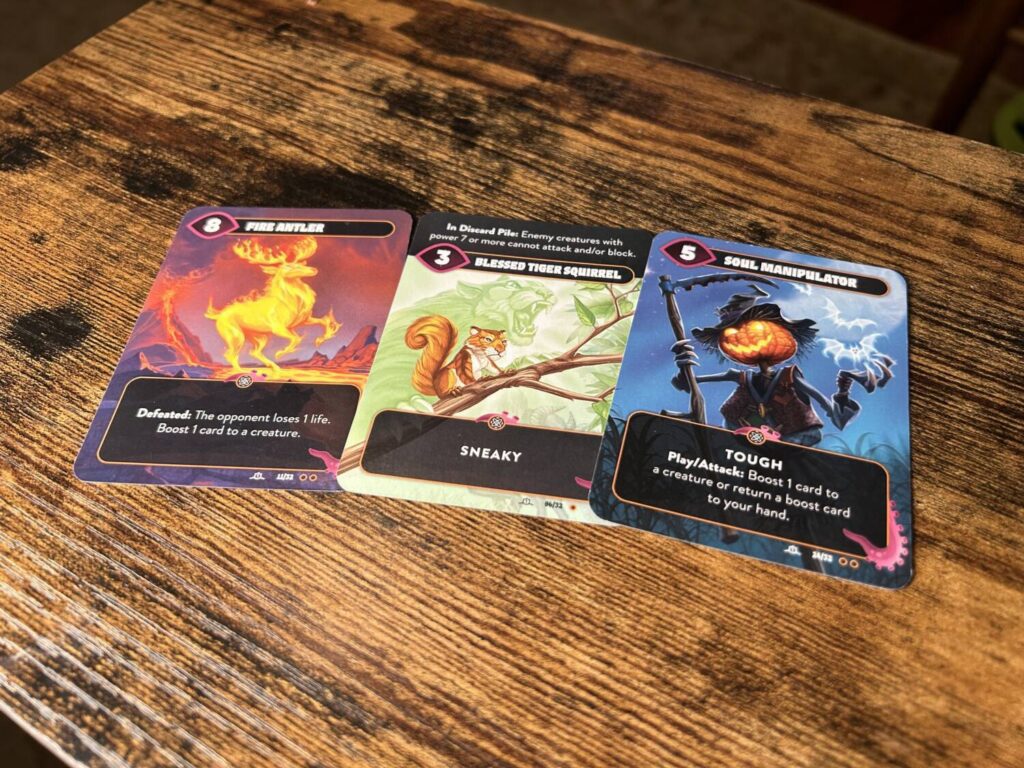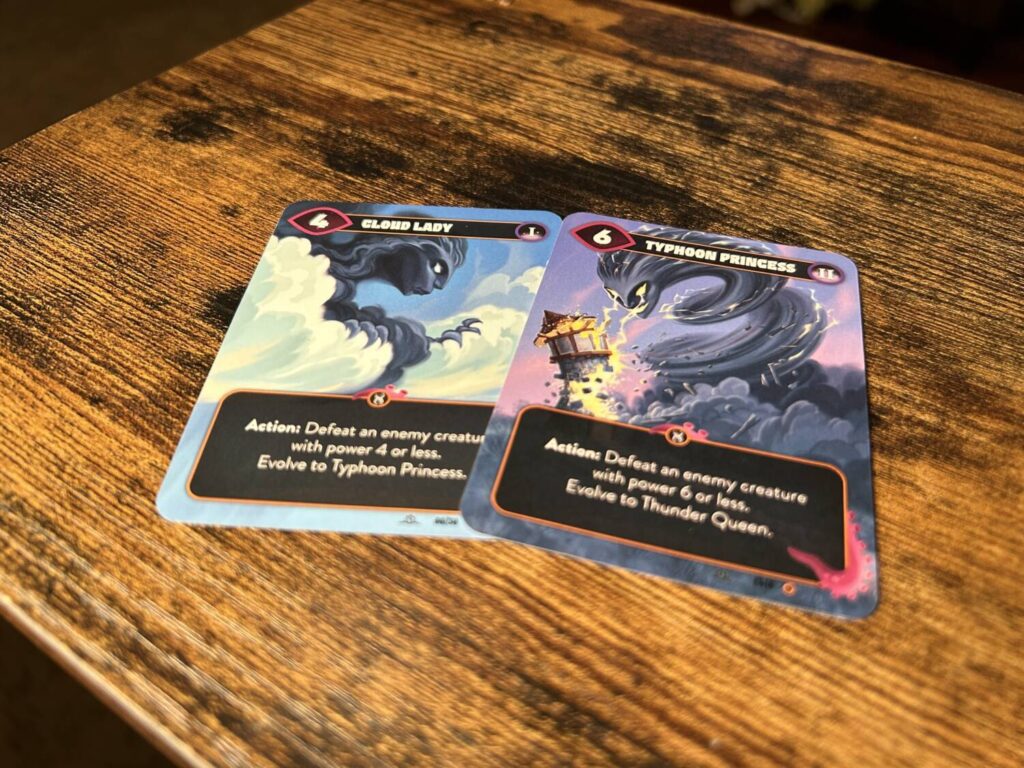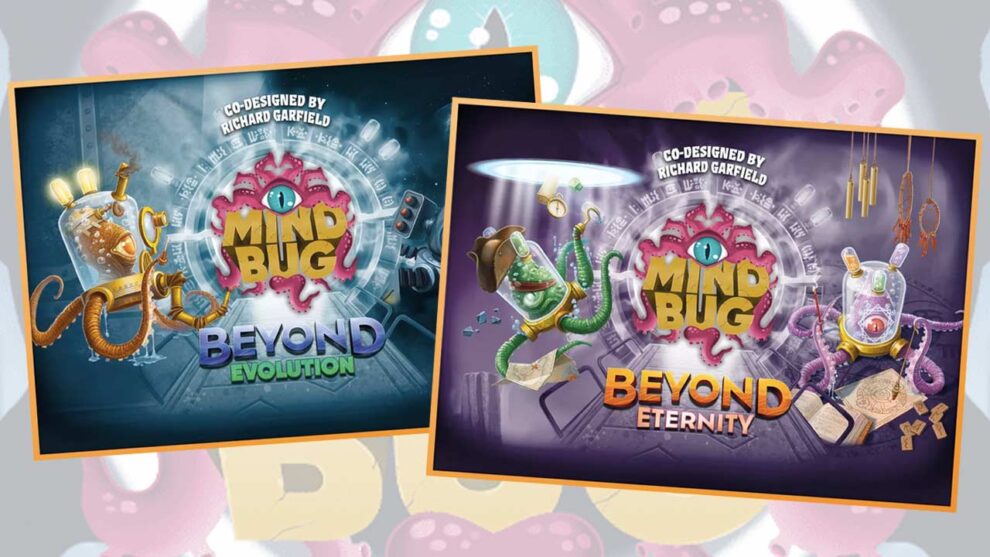Disclosure: Meeple Mountain received a free copy of this product in exchange for an honest, unbiased review. This review is not intended to be an endorsement.
Before diving into the two new expansions for Mindbug, the cocaine-addled card dueler I first reviewed back in 2021, I pulled the base game off the shelf for a refresher. It had taken me a while to warm up to this strange, spasmodic design. Mindbug is so streamlined, so reactive, so fundamentally swingy, that my first several games felt like they didn’t involve any decisions at all.
That definitely wasn’t the case, as I came to see with experience. Mindbug is full of interesting decisions. Except for when it isn’t. It’s complicated.
My feelings about the base game haven’t changed, though they have muted. My admiration has diminished. Returning, I found myself a bit bored, which was never a feeling I had when it first came out, even when I hadn’t found my way in yet. Sounds like a perfect time to inject some novelty.
 Don’t Mindbug If I Do
Don’t Mindbug If I Do
Any given Mindbug deck, be it the base game or any of the three expansions, is full of creature cards. Each creature is obscenely powerful in one way or another. Some are strong. Some are disruptive. Some are both. Nearly every card, by design, feels unbalanced, until you realize that there’s a perfect antidote somewhere else, and several imperfect antidotes besides.
You shuffle all of those creatures together, then deal each player a private deck of ten cards. From these decks, each player draws a hand of five cards. Those ten cards are all you get, which should give you some indication of how snappy this whole process is.
On your turn, you do one of two things. You either play a card from your hand—that’s it, there’s no resource required—or you pick one creature to attack. If you attack, your opponent can decide whether or not they want to block the attacking creature with one of their own, or take the hit. The winner is the first player to reduce their opponent’s health to 0.
That’s the straightforward, aerodynamic explanation. There’s more to it than that, of course. Card abilities form the bulk of Mindbug’s decision space. The ways they interact are never obscure, but they’re often interesting. Many a turn is spent agonizing over which card is the right card to play right now.
Odds are, none of them are.
This is all further complicated by the Mindbugs themselves. When you play a creature, I can Mindbug it, which immediately places the creature under my control before ceding the turn back to you. The Mindbugs are the central hook of the game. It’s right there in the title. This is a Take That game in which you shouldn’t attempt to dish out anything you aren’t immediately prepared to take.

Beyond Eternity
Beyond Eternity is the less interesting of the two expansions. Each works as a self-contained iteration, and my plays of Eternity didn’t feel terribly different from my plays of the base game. It is a bit more dynamic, but the highs don’t compare to Beyond Evolution, which feels like the best version of Mindbug so far.
Eternity adds two new mechanics. The first is Boosting, which allows you to take cards from either player’s discard and add them to your creatures to increase their power. The strength boost part of Boosting is well enough, but, in a game with such a tight card and creature economy, the more welcome implication is that your discarded cards are suddenly useful. You rarely want to lose a creature in Mindbug, but with Boosting, sometimes you do.

Other cards have abilities that trigger once they’ve been discarded. The expansion gets its name from this mechanic, the idea that the cards effect play from the afterlife, but, bizarrely, it’s barely implemented. We’re talking about four out of the forty-eight cards here. It is entirely possible, and even likely, that you’ll go an entire game without it ever coming up.
That’s unfortunate. The game is more fun with them in play. For one thing, they’re cool. For another, the whole mechanic adds another consideration to the play space. Forcing your opponent to discard a card in Mindbug is always a good idea. It’s fun to have it suddenly be a calculated risk. I wish it were slightly more of one. And if you shuffle Eternity together with the base game? Forget it. You can barely tell it’s there.
Beyond Evolution
I can’t fully explain what makes Beyond Evolution the best version of Mindbug, but there is simply no question that my games of Evolution are more tense, more interesting, more clever, and more fun than any other iteration.
The additions to the Mindbug formula here are relatively small. A few creatures can evolve, replacing the card with a more powerful version that isn’t shuffled into the deck. I enjoy them, but they don’t have any sort of interesting effect on the design space. While Beyond Eternity‘s new mechanic fundamentally changes the risk calculation of forcing your opponent to discard, evolving isn’t more than a fun gimmick. That’s not a complaint, and at least it integrates seamlessly, but it’s not a selling point.

The other new twist here is a third option for how to use some of your turns. Instead of playing a card or choosing a creature to attack, you can use any creature ability with the keyword “Action.” Another small, seamless change that isn’t a selling point.
So what, exactly, makes Beyond Evolution so good? I really don’t know. It’s my job to tell you, and I can’t. The powers are just a little more interesting, the ways they interact are a little nuttier. If every turn in Mindbug seems to rest on the edge of a razor, Evolution’s was just run across a whetstone.
Interesting
Two years ago, I kept returning to “interesting” as my adjective of choice to describe Mindbug, and that still fits the bill. It remains, for the most part, a game I admire more than adore. With these two expansions, I was worried for a time that Mindbug would jump the shark. Knowing what types of abilities your opponent might have was an important part of the game. Turns out the system is pared back enough that you always know what could be done, even with three times as many cards.
You can mix and match the various Mindbugs together in any way you want, and they all combine without issue. There are no crazy edge cases that emerge, because everything plays by the same rules. Despite the relatively narrow parameters in which everything has to operate, there are still new creatures that surprise me. That’s admirable. Mindbug still knows what it is and who it’s serving.
If you’re on the hunt to expand your Mindbug deck, either expansion is a worthy addition. One just happens to be more worthy than the other. If you’re a completist, you won’t be sorry to have picked up both Mindbug: Beyond Evolution and Beyond Eternity.
If, however, you have never played Mindbug and you’re curious? Beyond Evolution is where it’s at. I could shuffle all three together, I know, but I’m not interested in cutting Beyond Evolution with anything. At least not at the moment. That, in my opinion, is Mindbug as it’s meant to be experienced.



 Don’t Mindbug If I Do
Don’t Mindbug If I Do







Interesting.
😉